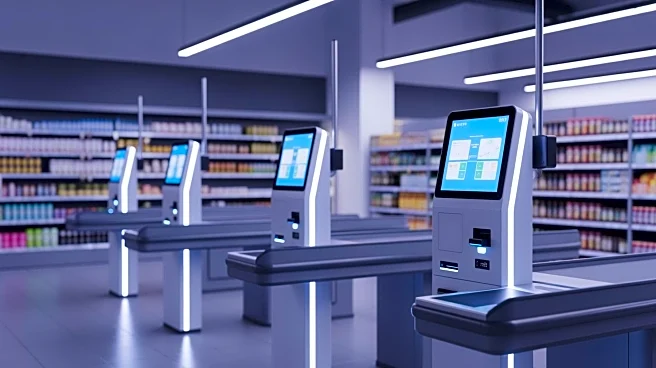What's Happening?
Self-checkout kiosks have become increasingly prevalent in grocery stores across the United States, with 96% of stores offering this option by 2024. This shift has led to a new norm where shoppers are
often required to bag their own groceries. The trend is explored in the latest episode of 'America Unfiltered,' where Anthony Salvanto examines whether these kiosks are a convenience that customers cannot live without or if they represent free labor for stores. The discussion highlights the growing reliance on self-service technology in retail environments and its impact on consumer behavior.
Why It's Important?
The widespread adoption of self-checkout kiosks in grocery stores signifies a major shift in retail operations, potentially affecting employment in the sector. While these kiosks offer convenience and efficiency for consumers, they also raise concerns about the reduction of cashier jobs and the expectation for customers to perform tasks traditionally handled by store employees. This development could lead to broader discussions on labor practices and the balance between technological advancement and job preservation. Retailers may benefit from reduced labor costs, but they must also consider customer satisfaction and the potential backlash from those who prefer human interaction during their shopping experience.
What's Next?
As self-checkout technology continues to evolve, grocery stores may further integrate these systems, potentially expanding their use to other areas of retail. Stakeholders, including labor unions and consumer advocacy groups, may push for regulations or guidelines to ensure fair labor practices and customer rights. Retailers will need to address these concerns while optimizing their operations to maintain competitiveness. The ongoing dialogue around self-checkout kiosks could influence future retail strategies and the development of new technologies aimed at enhancing the shopping experience.
Beyond the Headlines
The rise of self-checkout kiosks also touches on ethical considerations regarding consumer privacy and data collection. As these systems often require digital payment methods, they may inadvertently lead to increased data tracking and profiling of consumer habits. This aspect could spark debates on the balance between convenience and privacy, prompting discussions on how retailers manage and protect customer data.










